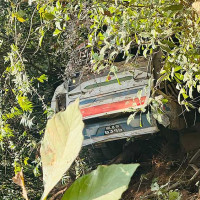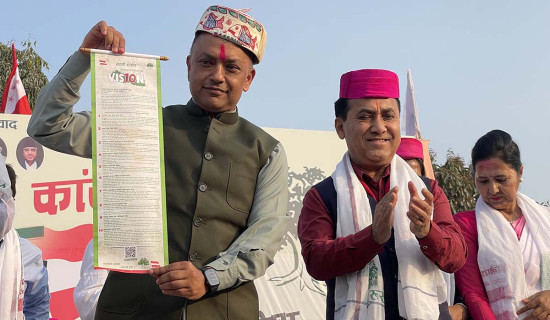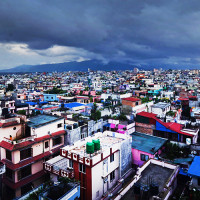- Thursday, 19 February 2026
Gen Z Protest Through Three Lenses
The Gen Z revolution that shook Nepal on September 8 and 9 was unexpected. Nevertheless, it caused huge human and physical losses. On the first day, the protest saw the death of the Gen Z youths owing to the repressive measures of the government. On the second day, the government buildings, the police offices and posts, the municipality buildings, and private houses were damaged fully or partially in response to the previous day's killing of the youths. The long-term cause of the revolt was attributed to rampant corruption that had infested almost all areas of governance. However, the ban on social media was the immediate cause behind the uprising.
Any revolution in Nepal can be analysed even from a geopolitical lens. This protest can’t even be an exception to it. Nepal's founding father, King Prithvi Narayan Shah, was right in comparing Nepal with a yam located between two boulders. However, now the third, fourth, and other boulders are perceived to have tried to squeeze the yam so that they can take benefit of Nepali soil. Embracing a non-aligned foreign policy and balancing relations with the immediate neighbours and other powerful nations are a must for peace, development and security of Nepalis. Nepal has not been politically stable for decades. Why has Nepal been unable to galvanise its efforts of development politically and economically? This scribe tries to furnish answers to this query by analysing it from three-level lenses.
Unethical conduct
At the individual level, corruption and unethical behaviours are rife because of greed, which can never be satisfied and results in the worst outcomes. Ironically, people revolting against corruption are taking the belongings out of the vandalised and torched buildings. They may not be the Gen Z youths, but after all, they are Nepalis. So, the acts of stealing the objects, gadgets and furniture during the revolution make everyone ashamed. Here I am talking about the unethical attitude and behaviour of people, ranging from politicians to the general public.
At the national level, the bad governance has given rise to public resentment. The government's inability to realise the aspirations of people, and particularly the young generation, impelled the youths to come to the streets. The lavish lifestyle of the ‘Nepo-Kids’ and the increasing cases of favoritism and nepotism angered the youths. There has been petty corruption in the government offices and policy-level corruption at the higher echelon of power. The successive governments were unable to solve the problem of poverty, unemployment, lower production, increasing dependency on imports, and many other negative economic and social indicators.
At the international level, some observers point out Nepal’s geopolitical positioning and the failure to balance the relations with the big nations behind the Gen Z movement. Though it is yet to be verified, the involvement of the various intelligence agencies of the powerful nations in Nepal can’t be ruled out. We can know from Chanakya’s era that the spies were sent to various small States to find out the weaknesses of the States and acted upon to destroy them and gain victory over them. The instance then was of a physical nature; however, in recent days, social media, trade and AI may have been used for destabilising the small States.
Solution
The solution to the ongoing crisis should be sustainable and based on a visionary outlook. Most importantly, the individual rulers, service providers and even the public should be ethical in their attitudes and behaviour. So, at the individual level, one should abandon greed and be ethical in conducting their duty and responsibility towards society and the nation. At the national level, good governance is essential. The public service delivery needs to follow the principles of accountability, consensus building, equality, responsibility, participatory, ethical conduct, rule-based order and transparency. The governance system should follow the democratic process, respecting human rights and enabling people to lead a dignified and respectful life.
Every citizen should feel the positive presence of the government in their life. The ongoing internal conflict should be resolved. The election is essential which will provide political procedural stability, resulting in social and economic advancement. At the international level, balancing with the great powers is essential. We need to be cautious about the unnecessary direct or indirect intervention in the internal affairs of Nepal by foreign forces. Here again, 'ethical diplomacy' matters most. Using diplomacy for private gain by politicians and bureaucrats should be discouraged and even made punishable. We should be sensitive that our acts will not pose a threat to our immediate or other neighbours. Foreign policy should really be the extension of domestic policies, which put national interest at the centre.
(The author writes on international issues.)



-original-thumb.jpg)











